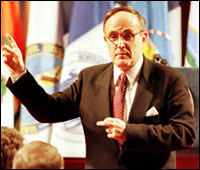Former New York City Mayor Rudy Giuliani — whose name is often bandied about as a possible 2008 GOP presidential contender — added a splash of deep red to his moderate-Republican profile when he announced last week his decision to join a Texas-based law firm known for representing heavy-hitting energy companies.
Enron, ChevronTexaco, Pacific Gas & Electric, Dynegy, and Southern Company are among the many powerhouses on the client roster of Bracewell & Giuliani — formerly Bracewell & Patterson. Having negotiated billions of dollars in transactions for fossil-fuel and power-generation facilities, and having defended some of those same clients against charges of illegal pollution, Bracewell has earned a reputation as one of the most powerful law firms in the energy sector.
The firm is equally potent on the D.C. lobbying front. It is Bracewell, for instance, that represents the Electric Reliability Coordinating Council — a huge coalition of utilities including Southern Company and First Energy that lobbies for industry-friendly policies. And it is Bracewell that employs Scott Segal and Frank Maisano, the two most ubiquitous voices in the media representing energy-industry interests — most recently advocating reform of the Clean Air Act’s new-source review provision, passage of the Clear Skies Act, and implementation of the Bush administration’s plan for dealing with mercury emissions from power plants.
Maisano and Segal were brimming with delight over the announcement. “It’s always flattering that one of your name partners is considered a man of presidential timbre,” Segal told Muckraker. Added Maisano, “Giuliani is a master lawyer and towering public figure … He’s going to help expand Bracewell’s reputation nationally and internationally.”
That is not to say that Giuliani will be turning his attention to energy matters specifically. Bracewell has a broad range of practices, representing companies working in health care, telecommunications, nanotechnology, and beyond. Giuliani came aboard to establish the firm’s first New York City branch, meaning he will spend little time on Capitol Hill and “won’t be doing anything in the way of lobbying or government relations,” according to his spokesperson, Sunny Mindel. But he will be using his experience and reputation “to expand on the existing focus of Bracewell,” she said. Of course, the clout that Giuliani brings to the law firm could only redouble its influence in the Beltway.
And Giuliani is not new to the business of representing energy companies. His consulting company, Giuliani Partners, which he founded post-9/11, was hired by Entergy Nuclear Northeast to help with security and emergency planning at its nuclear power plants, and by TransCanada and Shell to help smooth the way for their joint plan to build an offshore liquefied natural gas facility on Long Island Sound.
As mayor of New York City, Giuliani’s environmental record was mixed — “pretty unremarkable, and at times dismal,” said Ashok Gupta, chief energy economist for the New York City-based Natural Resources Defense Council. But he noted that Giuliani was “supportive” of the environmentally ambitious green-development projects of his close friend and colleague George Pataki, governor of New York.
While Giuliani has been cozy with the Bush administration on national-security issues and hawkish on military strategy, political analysts have always characterized him as socially liberal (as any mayor of New York is wont to be), and put him squarely in the camp of moderate Republicans including Sen. John McCain (R-Ariz.), California Gov. Arnold Schwarzenegger (R), and Pataki — all of whom have championed environmental protections.
According to David Sandalow, an environmental scholar at the Brookings Institution and former assistant secretary of state under President Clinton, Giuliani’s decision to join Bracewell raises a critical question: “Is he a Pataki Republican or a Bush Republican?”
Some suggest that Giuliani’s alliance with Bracewell means he’s tipping rightward. “Bracewell employees have been major contributors to the Bush campaigns,” noted Eric Schaeffer, director of the Environmental Integrity Project. Frank O’Donnell, president of Clean Air Watch, also pointed out that “by having his name in the title of one of Texas’ most prominent law firms, Giuliani could establish convenient fund-raising ties with energy executives.”
Indeed, Rich Kinder, chair of the Houston-based energy company Kinder Morgan, whose wife is a top Bush fund-raiser, sang Giuliani’s praises in the Houston Chronicle last week: “I think he would be an excellent rainmaker.”
Mindel, Giuliani’s spokesperson, insisted that his decision to join Bracewell “has nothing at all to do with political aspirations,” a point Giuliani has stressed himself. She added that he has not made any decisions about running for office.
Whether or not his latest career move was motivated by presidential ambitions, it seems Giuliani has chosen to side with old-guard Texas business interests rather than the small cohort of moderate Republicans that is trying to reverse its party’s anti-environment agenda.


